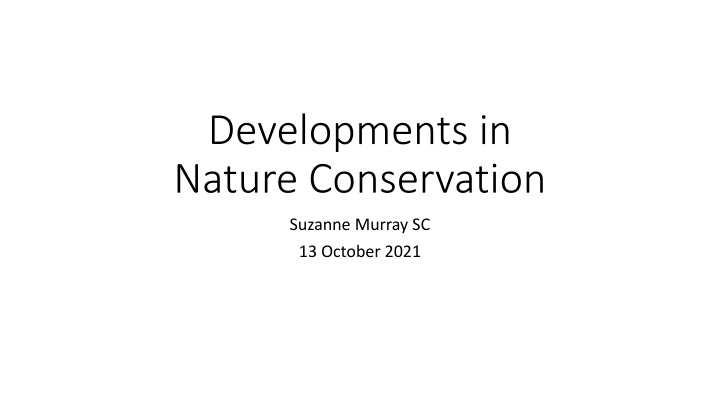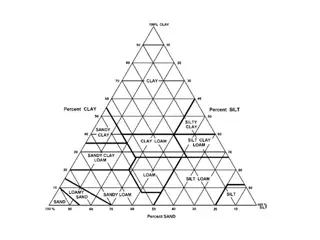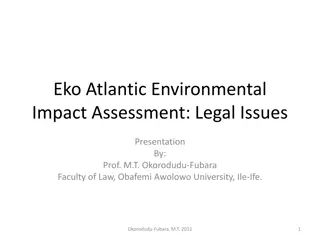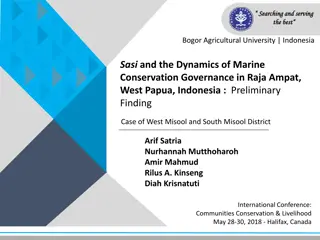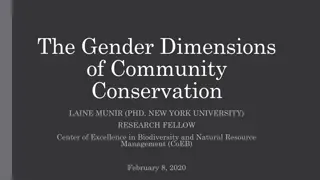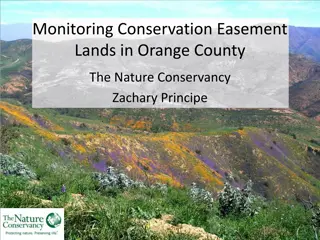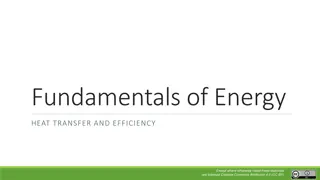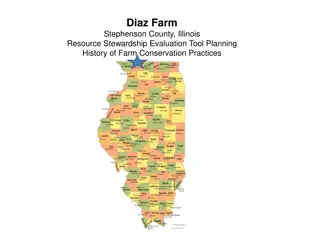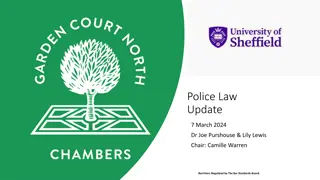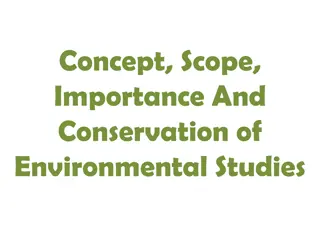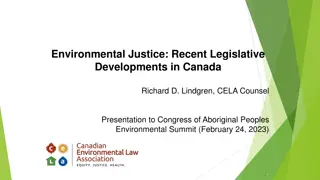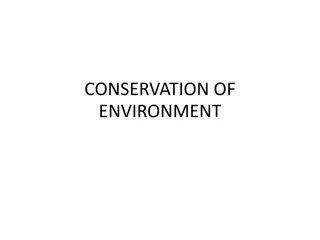Legal Questions Surrounding Environmental Impact Assessment in Recent Conservation Developments
Recent developments in nature conservation, focusing on a legal case involving Eco Advocacy v. An Bord Pleanala from 2021. The case revolves around the European Union laws and the Environmental Impact Assessment directive, questioning the procedures and requirements for assessing environmental impacts in development projects. Key legal questions are raised regarding the application of EU law in environmental matters and the necessity of explicit reasoning in administrative decisions related to environmental impact assessments.
Download Presentation

Please find below an Image/Link to download the presentation.
The content on the website is provided AS IS for your information and personal use only. It may not be sold, licensed, or shared on other websites without obtaining consent from the author.If you encounter any issues during the download, it is possible that the publisher has removed the file from their server.
You are allowed to download the files provided on this website for personal or commercial use, subject to the condition that they are used lawfully. All files are the property of their respective owners.
The content on the website is provided AS IS for your information and personal use only. It may not be sold, licensed, or shared on other websites without obtaining consent from the author.
E N D
Presentation Transcript
Developments in Nature Conservation Suzanne Murray SC 13 October 2021
Eco Advocacy v An Bord Pleanala[2021] IEHC 265 PP granted for 320 dwellings in Trim Application site proximate to the River Boyne and River Blackwater SAC and SPA Application was accompanied by a Stage 1 Screening Report Numerous grounds raised in the case Focus on EIA / AA Grounds
Eco Advocacy v An Bord Pleanala[2021] IEHC 265 EIA Screening Applicant argued that there was a requirement for an express statement as to what documents exactly set out the reason of the competent authority in respect of its EIA Screening Decision Court identified 3 possible questions that could be referred
Eco Advocacy v An Bord Pleanala[2021] IEHC 265 Question 1 Does the general principle of the primacy of EU law and/or of co- operation in good faith have the effect that, either generally or in the specific context of environmental law, where a party brings proceedings challenging the validity of an administrative measure by reference, expressly or impliedly, to a particular instrument of EU law, but does not specify which provisions of the instrument have been infringed, or by reference to which precise interpretation, the domestic court before which proceedings are brought must, or may, examine the complaint, notwithstanding any rule of domestic procedure requiring the specific breaches concerned to be set out in the party s written pleadings.
Eco Advocacy v An Bord Pleanala[2021] IEHC 265 Question 2 If the answer to the first question is yes , whether art. 4(2), (3), (4) and/or (5) and/or Annex III of the EIA directive 2011/92 and/or the directive read in the light of the principle of legal certainty and good administration under art. 41 of the Charter of Fundamental Rights of the European Union have the consequence that, where a competent authority decides not to subject a proposal for development consent to the process of environmental impact assessment, there should be an express statement as to what documents exactly set out the reasons of the competent authority; and
Eco Advocacy v An Bord Pleanala[2021] IEHC 265 Question 3 If the answer to the first question is yes , whether art. 4(2), (3), (4) and/or (5) and/or Annex III of the EIA directive 2011/92 and/or the directive read in the light of the principle of legal certainty and good administration under art. 41 of the Charter of Fundamental Rights of the European Union have the consequence that, where a competent authority decides not to subject a proposal for development consent to the process of environmental impact assessment, there is an obligation to expressly set out consideration of all specific headings and sub-headings in annex III of the EIA directive, insofar as those headings and sub-headings are potentially relevant to the development.
Eco Advocacy v An Bord Pleanala[2021] IEHC 265 Habitats Directive Mitigation measures and screening for AA Inspector in her report referred to the design of the surface water treatment plant which will be constructed and operated in accordance with standard environmental features in her assessment Applicant argued that in effect the Inspector had considered a mitigation measure in screening out need for AA Applicant also criticised the Board s record of its screening determination
Eco Advocacy v An Bord Pleanala[2021] IEHC 265 Question was whether the surface water drainage system was a mitigation measure or not on the basis that it is simply a standard feature of the design that has nothing to do with European sites Referred to CJEU decision in POW v Coillte It is not appropriate at the screening stage to take account of the measures intended to avoid or reduce the harmful effects of the plan or project on that site High Court considered that it wasn t clear whether mitigation measures should not be considered even if they are an integral part of the design Also queried whether it is relevant that the measures are standard practice or not
Eco Advocacy v An Bord Pleanala[2021] IEHC 265 Question 4 Whether art. 6(3) of directive 92/43/EEC is to be interpreted as meaning that, in the application of the principle that in order to determine whether it is necessary to carry out, subsequently, an appropriate assessment of the implications, for a site concerned, of a plan or project, it is not appropriate, at the screening stage, to take account of the measures intended to avoid or reduce the harmful effects of the plan or project on that site, the competent authority of a member state is entitled to take account of features of the plan or project involving the removal of contaminants that may have the effect of reducing harmful effects on the European site solely on the grounds that those features are not intended as mitigation measures even if they have that effect, and that they would have been incorporated in the design as standard features irrespective of any effect on the European site concerned.
Eco Advocacy v An Bord Pleanala[2021] IEHC 265 Consideration of submissions Submissions had been made by An Taisce re: concerns for the water quality in the River Boyne as a result of the proposed development Storm drains would send surface water to a stream that flows to the River Boyne The Council Heritage Officer in her report stated that the Board should satisfy itself as to the efficacy of SUDS to ensure no significant effects on Natura 2000 sites Question was whether there was a requirement to expressly respond to all expert points made during the screening process
Eco Advocacy v An Bord Pleanala[2021] IEHC 265 Question 5 Whether art. 6(3) of directive 92/43/EEC is to be interpreted as meaning that, where the competent authority of a member state is satisfied notwithstanding the questions or concerns expressed by expert bodies in holding at the screening stage that no appropriate assessment is required, the authority must give an explicit and detailed statement of reasons capable of dispelling all reasonable scientific doubt concerning the effects of the works envisaged on the European site concerned, and that expressly and individually removes each of the doubts raised in that regard during the public participation process.
Eco Advocacy v An Bord Pleanala[2021] IEHC 265 Question 6 If the answer to the first question is yes , whether art. 6 (3) of the habitats directive 92/43 and/or the directive read in the light of the principle of legal certainty and good administration under art. 41 of the Charter of Fundamental Rights of the European Union has the consequence that, where a competent authority decides not to subject a proposal for development consent to the process of appropriate assessment, there should be an express statement as to what documents exactly set out the reason of the competent authority.
Eco Advocacy v An Bord Pleanla[2021] IEHC 610 Court decided in principle to refer questions to the CJEU An Taisce and ClientEarth were joined on their application as amicus curiae This judgment records the questions to be referred and the position of the parties in respect of how the questions should be answered Also sets out the Court s proposed answer to the question
Hellfire Massy Residents Assoc v An Bord Plean la [2021] IEHC 424 Related to a visitor centre at the Hellfire Club in County Dublin Local authority own development Application submitted directly to the Board under section 175 of the 2000 Act as the application required an EIAR Part of the development related to a tree canopy walk / pedestrian bridge over the local road Inspector s first report raised issues with the impact of the bridge and considered that it had not been fully assessed In particular the Inspector considered that limited surveys of Massy s Wood had been carried out
Hellfire Massy Residents Assoc v An Bord Plean la [2021] IEHC 424 Inspector s main concerns were with biodiversity In particular impact on native red squirrels A squirrel drey had been recorded Observers had provided evidence of squirrel dreys in Massy Wood EIAR referred to the loss of a drey and that a Derogation licence would be sought to destroy one drey But that was contradicted at the oral hearing where it was stated that the design of the car park was arranged to avoid the drey Also concerns about the lack of baseline survey data on bats and otters Significant concern about the lack of information on birds
Hellfire Massy Residents Assoc v An Bord Plean la [2021] IEHC 424 Inspector concluded that a Stage 2 AA was required but no NIS had been submitted Board requested FI Additional bird survey Preparation of a NIS Additional survey of habitats Updated EIAR Requested FI was submitted
Hellfire Massy Residents Assoc v An Bord Plean la [2021] IEHC 424 Inspector was satisfied with the information provided Was satisfied that the gaps in the information had been resolved Board decided to grant permission
Hellfire Massy Residents Assoc v An Bord Plean la [2021] IEHC 424 High Court (Humphreys J.) dismissed the case as against the Board i.e. no order of certiorari granted However, continued with the case as against the State Number of grounds proceeded against the State
Hellfire Massy Residents Assoc v An Bord Plean la [2021] IEHC 424 Post consent Derogation Licences Applicants complaint was that post consent derogation licences is incompatible with the requirements of strict protection for purpose of Habitats Directive (article 12) Article 12 requires that MS take the requisite measures to establish a system of strict protection prohibiting (a) All forms of deliberate capture or killing of specimens of these species in the wild; (b) Deliberate disturbance of these species, particularly during the period of breeding, rearing, hibernation and migration; (c) Deliberate destruction or taking of eggs from the wild; (d) Deterioration or destruction of breeding sites or resting places. Article 16 provides for a derogation from the requirements of article 12
Hellfire Massy Residents Assoc v An Bord Plean la [2021] IEHC 424 Applicants alleged that article 51 and 54 of the 2011 Habitats Regulations fail adequately to implement article 12 and 16 of the Habitats Directive Article 51 to 53 of the 2011 Regulations establish a system of strict protection Article 54 provides for the grant of a derogation licence A Derogation Licence is required where there is the potential for disturbance to a species referred to in Part 1 of the First Schedule. A Derogation Licence can be granted where there is no satisfactory alternative and the derogation is not detrimental to the maintenance of the populations of the species concerned at a favourable conservation status and in their natural range. The approval does not entitle the holder of the licence to engage in any activity prohibited by the 2011 Regulations, save in accordance with a derogation licence granted pursuant to Article 54.
Hellfire Massy Residents Assoc v An Bord Plean la [2021] IEHC 424 Applicants alleged that article 51 and 54 do not create a system that prevents the Council from proceeding with the project which will disturb protected species or cause damage or deterioration to breeding sites, foraging or resting places The system leaves it to the Council to decide if it is going to apply for a Derogation Licence Applicant argued that the Council was at large as to what type of survey effort it will carry out or whether it will seek a Derogation Licence
Hellfire Massy Residents Assoc v An Bord Plean la [2021] IEHC 424 As such the parallel planning and derogation system are only linked on a voluntary basis and that this is the antithesis of a system of strict protection Particularly the case where the developer has a clear and vested interest in not linking the two systems
Hellfire Massy Residents Assoc v An Bord Plean la [2021] IEHC 424 The Board are not required to determine whether there will be deliberate disturbance or damage or deterioration to breeding sites / resting places Not clear if the Board can refuse pp on the basis of a breach of Article 51 Also complaint about lack of public participation in the process none provided for in article 54 Propose to refer 4 questions First two questions relate to the interplay between domestic procedural law rules and requirements of EU Law Fourth question related to public participation in the derogation licence procedure
Hellfire Massy Residents Assoc v An Bord Plean la [2021] IEHC 424 The third question relates to the derogation licence system and whether that process should be integrated into the development consent process Question of whether a link is required as a matter of European Law between the planning consent and the derogation licence procedure
Hellfire Massy Residents Assoc v An Bord Plean la [2021] IEHC 424 PROPOSED QUESTION 3 The third question is whether arts. 12 and/or 16 of directive 92/43/EEC and/or those provisions as read in conjunction with arts. 6(1) to (9) and/or 9(2) of the Convention on Access to Information, Public Participation in Decision-Making and Access to Justice in Environmental Matters done at Aarhus, Denmark, on 25 June 1998 and/or with the principle that member states must take all the requisite specific measures for the effective implementation of the directive have the effect that a derogation licence system provided in domestic law to give effect to art. 16 of the directive should not be parallel to and independent of the development consent system but should be part of an integrated approval process involving a decision by a competent authority (as opposed to an ad hoc judgement formed by the developer itself on the basis of a general provision of criminal law) as to whether a derogation licence should be applied for by reason of matters identified following the grant of development consent and/or involving a decision by a competent authority as to what surveys are required in the context of consideration as to whether such a licence should be applied for.
Hellfire Massy Residents Assoc v An Bord Plean la [2021] IEHC 424 PROPOSED QUESTION 1 The first question is whether the general principles of EU law arising from the supremacy of the EU legal order have the effect that a rule of domestic procedure whereby an applicant in judicial review must expressly plead the relevant legal provisions cannot preclude an applicant who challenges the compatibility of domestic law with identified EU law from also relying on a challenge based on legal doctrines or instruments that are to be read as inherently relevant to the interpretation of such EU law, such as the principle that EU environmental law should be read in conjunction with the Aarhus Convention as an integral part of the EU legal order.
Hellfire Massy Residents Assoc v An Bord Plean la [2021] IEHC 424 PROPOSED QUESTION 2 The second question is whether arts. 12 and/or 16 of directive 92/43/EEC and/or those provisions as read in conjunction with art. 9(2) of the Convention on Access to Information, Public Participation in DecisionMaking and Access to Justice in Environmental Matters done at Aarhus, Denmark, on 25 June 1998 and/or in conjunction with the principle that member states must take all the requisite specific measures for the effective implementation of the directive have the effect that a rule of domestic procedure whereby an applicant must not raise a hypothetical question and must be affected in reality or as a matter of fact before she can complain regarding the compatibility of the domestic law with a provision of EU law cannot be relied on to preclude a challenge made by an applicant who has invoked the public participation rights in respect of an administrative decision and who then wishes to pursue a challenge to the validity of a provision of domestic law by reference to EU law in anticipation of future damage to the environment as result of an alleged shortcoming in the domestic law, where there is a reasonable possibility of such future damage, in particular because the development has been authorised in an area which is a habitat for species subject to strict protection and/or because applying the precautionary approach there is a possibility that post-consent surveys may give rise to a need to apply for a derogation under art. 16 of the directive.
Hellfire Massy Residents Assoc v An Bord Plean la [2021] IEHC 424 PROPOSED QUESTION 4 The fourth question is whether arts. 12 and/or 16 of directive 92/43/EEC and/or those provisions as read in conjunction with arts. 6(1) to (9) and/or 9(2) of the Convention on Access to Information, Public Participation in Decision-Making and Access to Justice in Environmental Matters done at Aarhus, Denmark, on 25 June 1998 have the consequence that, in respect of a development where the grant of development consent was subjected to appropriate assessment under art. 6(3) of directive 92/43/EEC, and in a context where a post-consent derogation may be sought under art. 16 of directive 92/43/EEC, there is a requirement for a public participation procedure in conformity with art. 6 of the Aarhus Convention.
Hellfire Massy Residents Assoc v An Bord Plean la [2021] IEHC 424 Current status High Court has refused a certificate for leave to appeal to the Applicant in respect of other elements of its judgment (delivered today) Order for reference is to be finalised That should be done by 29 November 2021
Waltham Abbey v An Bord Pleanla [2021] IEHC 312 One of the grounds related to the adequacy of the information in relation to bats EIA Ground Applicant complained about a lack of full bat survey Also complaint about lack of consideration of strict protection for bats under the habitats directive Court didn t decide the question on the basis that it had already held for the applicant on another grounds BUT the court did say that if it had been necessary to have to come to a conclusion on this that he would have given consideration to referring the following questions to the CJEU
Waltham Abbey v An Bord Pleanla [2021] IEHC 312 whether para. 3(b) of annex IIA of the EIA directive, insofar as it refers to provision of information on biodiversity as relating to any likely significant effects, to the extent of the information available on such effects , imposes a requirement on the developer to obtain such information by conducting adequate scientific surveys of relevant species; and
Waltham Abbey v An Bord Pleanla [2021] IEHC 312 (ii). whether art. 4 of the EIA directive alone and/or in combination with art. 11 and/or art. 3(b) of annex IIA have the effect that a decision that public participation is not required should be informed by adequate scientific surveys of relevant species and/or by a consideration of whether the development if carried out would engage the provisions of art. 12 of the habitats directive, either in general or where the competent authority receives information from third parties as to such impacts where those impacts are not addressed in the information provided by the developer.
AND ONE TO WATCH OUT FOR AT HOME AND ONE TO WATCH OUT FOR AT HOME
An Taisce v An Bord Pleanala SC Determination [2021] IESCDET 109 Challenge by An Taisce to the grant of permission to Glanbia for a specialised cheese factory in Kilkenny High Court (Humphreys J.) refused the application for judicial review ([2021] IEHC 254 High Court (Humphreys J.) refused the certificate for leave to appeal ([2021] IEHC 422 An Taisce petitioned the Supreme Court for leap-frog appeal
An Taisce v An Bord Pleanala SC Determination [2021] IESCDET 109 Determination dated 23 September 2021 Granted leave to appeal 4. As appears from the notices filed and from the judgment of the High Court (An Taisce v. An B rd Plean la & ors [2021] IEHC 254), the issue in these proceedings, which is said to meet the constitutional threshold for leave to appeal, concerns questions about evidence, and the obligation to produce same, in cases where a proposed development may involve potential effects on areas protected under the Habitats Directive (Directive 92/43/EEC as amended). In such cases a development consent can ordinarily only be given where it has been assessed that there is no reasonable scientific doubt that the integrity of the relevant site will be preserved having regard to its conservation objective (see Connelly v. An B rd Plean la & ors [2018] IESC 31, [2018] ILRM 453).
An Taisce v An Bord Pleanala SC Determination [2021] IESCDET 109 7. There may well be a legitimate debate between the parties as to the proper characterisation of the test applied in practice by the trial judge. However, there is no doubt but that a body granting a development consent which potentially impacts on the sort of sensitive site identified in the Habitats Directive is required to be satisfied that all scientific doubt has been removed as to whether there might be adverse effects on the integrity of the site concerned having regard to it conservation objectives. While that principle is clear there are, in the Court s view, questions as to how evidence in that regard should be dealt with in a challenge brought to a consent granted.
An Taisce v An Bord Pleanala SC Determination [2021] IESCDET 109 8. In those circumstances the Court does not think it appropriate at this stage to attempt to resolve the disputes between the parties concerning the proper characterisation of the test applied by the trial judge. The Court does consider that bringing further clarity as to the proper approach to evidence or argument in relation to relevant scientific matters in judicial review proceedings of this type is a matter of general public importance which arises in these proceedings. In those circumstances the Court will grant leave to appeal.
DISCLAIMER No liability whatsoever whether in contract, negligence, negligent misstatement or otherwise at all is accepted to any person arising out of his or her reliance on the content of this presentation. This presentation does not purport to contain legal advice and should not be relied upon as such. 38
